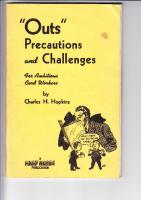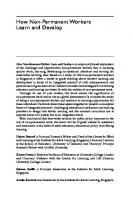Outs - Precautions and Challenges for Ambitious Card Workers
Outs - Precautions and Challenges for Ambitious Card Workers - Charles H. Hopkins - 1978.
251 65 5MB
English Pages 42 Year 1978
o1
o2
Recommend Papers

- Author / Uploaded
- Charles H. Hopkins
File loading please wait...
Citation preview
"Outs" Pr ecautions
a-a Challeng es 67aD
Anfutaaat
ea/Dl Uarrbe/tt
bv Charles
H. Hopkinr
A
WWgS PUBUGANOil
"Outstt Precrutiong a./ Challen ges 4ot,4tfui eard Alarbu
Er CHABI.ETI H. HOPrINS
lLlUSrAATtOnS
!Y
WALIER S. FOGG
?
1978
MICKY HADES INTERNATIONAL Box 476, Calgary, Alberia, Canada
PRETRTE. . . Prefaces do not mean anyttring of importance. This one is no exception. The material has been put into print very largely because of the urgings of many friends. Among these, and one of the most persistent, has been Walter Fogg. In fact, he was such a pest that an "out" had to be used on him. "Well, if you feel so strongly about it, why don't you do the writing?"
So he did just that FIRST EDITION
Copyright l94O by Charles Hopkins
SECOND EDITION Copyright
@ tszs by
Michael
P.
Hades
As a matter of fact, the explaining of what is in one person's mind, for the purpose of having a
second person get it down on paper, seems to be a pretty good way to strain out the "bugs." When the writer gets descriptions "all balled up," the author gets them straightened out. After many a wrangle, agreement is
reached.
It is hoped that the
\
readers agree also.
This seems to have turned out to be a pretty fair preface after all. I wish I had written it myself. Anyhow, my hands were used for the drawings' Philadelphia, Pa. November, 194O
CHARLES H. HOPKINS
TRB1E OT IONTENIS INTNODUCTION When Asked To Do The Impossible School Yourself For All Emergencies Experience Still The Best Teacher
l0 1l
It
PART I_'OTNS" Chapter l-Fqcing The Muslc Whose Fault When Things Go Wrong? The Psychology of Failure Use of "Sucker Gag" Technique ,
15
l6 t7
.
Chcrpter
2-Organizing For Victory
Secret and Open "Outs"
When Error Is Still Under Cover (l) Card correctly identified, but slips out of control .... (2\ Identification corect, but placement for climax is wrong When Error May Be Visible (3) fncorrect identification of selected card .
(4) (5)
.
Card lost before identification Selector forgets what his card was
Either You Know You Are Wrong--Or Else . Chcpter 3-Inlormction-Gctting Subtleties This Time You Must Be Right Attitudes That Get Co-Operation (6) When they refuse to tell (7) For the €xtreme hold-out (8) Use a thumb-writer
(9)
Impression methods
(10) Pencil reading
(ll)
m€et an absolute refusal to tell
Chcrpter
20 20
2l 2l 2l
n 22 23
23 24 25
26
Friendly mirrors
(12) To
r8
l8 l9 t9
,?6
%
Fliome
Hcmdy Sleighte Old Ideas Brought Up To Date; Also A Few New Ones . . . . (13) The "Top Peek"
27
a
(14) The "Fan Crimp,, (15) The ',Deck Crimp,, (16) The Crimp as a locator
(38) The "Gimmicked (39) The "Cut Break',
(41) The "Cut Force,,
(19) The "Gambler,s Bridge', (20) The "Change Throwi
(44)
Chcrpter S-"Outs', To The Rescue The Weapon To The Needs
Getting Down To Brass Tacks . A"d Quick Switches And Other Fast Clor;.;-.':.
!?ll I*,
!?l)
;h; S.r..i.J C".i
.
performer's pocket
.....
..
6
67 67
Chcpter 9-Bordering On The Mentcl When Information-Getting Becomes Ticklish They Commit Themsetv.Jin Writin; .l. .
.
(51) Pencil reading (52) Billet switching (53) Biltet.Index ..........
" r"J l-f,*.r"", . :... .. .... ...:, ' 1yj (55)Trick'notebooks ..........' (56)
Apparatus Alibis
A
.
Challenges
Caution
Chcpter 7-Belore Card Getg Lost In Shuflle Try To Keep As Much Control As possibl,e (36) Controlled returns (37) Use of locators
5t 52
53 53
54
"C,ase
68 69 69 69
.
of Humbuggery" .. . .... A Prophet In His Own LanJ-. .: .... ..... _ (57) Thumb writers sry:i{ !9cks on r"p .. (58) The "Brain'Wave,,Deck . (59) New Era "Instanto, Deck
PART tr_CHAI.IENGES Chcpter 6-Tcking On AII Comers A Word Of
ffi
(48) Secret reflectors (49) Wide and narrow decks (50) Indexed pocket deck again
(29) Pocket index .. (30) Card in wallet (31) Use of spectators for ,.outs', (32) The "Eveready Life Saver',
With
il
65
The Magician's Little Helpers
.
"Outs" Productions From pockets And Other places
'lO_uts" Compared
63
63
(46) Scrapes and nicks (47) Daubs
.,outs,, Using ...... -(?4) For Locators for Methods Counting And Spelling Effects (25) The "Pitot Cird" .. . .. .. :... ...... (26) New start from wrong turn_up (27) The "220 Count, as ai ,.out', l
(33) When Force Is Missed First Aid for Feeble Memories (34) Confusion as to suits and values (35) Spectator's mind a complete blank
8-When They ..Give you The \iyorkg,,
(aS) t oot for informal ,,readers,,
-
(41 t"
60
6t
How-Plenty of Rein Trips Them
the-open changes
ol *.ong card
58 58
Pte-arrangements
C:hcrptcr
a sas
replacement _Forced
s7
Astonishing Simplicity (42) "Blindman's,-Bluff',, (43) Ttre "220 Count',
Other Useful Standard Sleights
\!=), !ut-;n
s4 55 56
(4O) Estimating the cut
(1? The "Fan Jog,, (1!) Th. "Quarter Bridge,,
Fit
Cut,,
..
7t
"""'
7r
7t
... . :. . ::. :. .,. . 7t
Chcpter l0-Trtclrery Conquen AII What Makes Audiences Get That W"y . Circumstances That Up To Ch"ii.r;s . ... Specific Handling ofk"d Various Situ"tioro .'. The Heckler . . Ding gust His Bun*.i'. .......... Inteltigent Anatyit Typ. .......-. Iot Tl. Troubles Arising Out of irrr. Frienaship . More To Come? . Well, Maybet .:...
72 72 73
7s 74
74 7S
:::
76 76 77 78 79
,l
l0
,.OIJTS," PRECAUTIONS AND CHALLENGES
.,OIJTS," PRECAUTIONS AND CHALLENGES
Introduction
Full details will be presented on later pages, but at this point we would emphasize the fact that, from the magi's viewpoint, the psychological angles are quite similar for both getting yourself out of a hole caused by accidental error and getting yourself over a mountain of supposed difficulties purposely thrown up by others. When the card you turn over is not the right one, unless you have been forehanded enough to glimpse
The fascination of card tricks without number depends largely on the fact that the chances for success are 50 to I against the performer. Surely, when the mark is hit every time, it tnust be magic t Furthermore, continued success
in a series of increasingly difficult tests stamps the performer as
a positive genius. Yet a single failure may break the chain and drop you back to the status of "just another magician." Seeds of failure lurk on both sides of the footlights. Not only may the performer make a mistake in handling his cards; too frequently members of the audience, either, do not understand what they are expected to do. Rarely, somebody will deliberately "cross you up." No matter how plans come to be upset, it is distinctly up to the performer to emerge victorious. That this can be done I00% is proved by the writer's 30 or more years' experience with all kinds (and conditions) of audiences. In fact, he has built an exclusive and still secret routine around methods of getting out of trouble. Some day it may be published.
il
accurately the selected card while the glimpsing was good, you are in exactly the position of starting from scratch with a card that has been selected mentally without any control on your Part. Hence, "outs" and "challenges" have much in common.
School YourseH For AII Emergencies of any kind are
seldom conquered before real damage is done unless there has been thorough preparation to meet every expectable hazard,. For example, consider fire.
Troubles
Schools, factories, ships, etc., built within the last decade are all of fireproof construction. Everything possible has been done to prevent the start of a fire-just as every capable card worker takes every precaution against being "burned up" at the finish of a trick. However, against the day when things made by human hands fall prey to human errors, school children, factory workers and ship crews are regularly drilled to meet emergencies in a pre-ordained orderly manner. The alarm sounds and all march out to safety-using the exit indicated from previous training expeliences.
When Asked To Do The Impossible Whenever the card worker does achieve an outstanding success there is always a chance of meeting a possible pitfall before the performance is over. All of us have met the frustrated "wise guy" who wants things done his way. On the other hand there are those who sincerely desire to test our abilities. Why r€st on your laurels when such drallenges can tre met with assurance of victory ? Far better it is to score a direct win over an obstreperous opponent than to side-step him; much more gracious to an important patron to accede to his wishes rather than plead another engagement.
With an all-magician audience this abilify to meet challenge conditions will build your reputation no end.
Erperience Still the Best Tecrcher "Learn by doing" is the way to avoid the perils of fire. Fortunately, the learning can be done without any real fire being present. However, learning to meet the emergencies of card work is not only quicker but more sure in results obtained when based on actual happenings. The mechanics and method of presenting almost any trick can be learned in practice by oneself, the polishing being done before friends in advance of public showing. Getting yourself out of a hole is different; no matter how keen is your memory of holes previously encounter€d, the ones that are ahead are each and every one a problem in itself. You never can tell when or where "fire will burn a hole thru the floor" and let you down. Perhaps, sometimes you will wish it would I But don't be discouraged;
..OI'TS," PRECAUTIONS AND CHALLENGES
T2
the knowledge you will gain from the following pages will provide brightly illuminated "exit signs" to cope with every possible emerg,ency. Then
of various situations soon glory when the real tests come. develops confidence to win thru to mental practice
in the
invention and solving
Why are we so confident? First, because y€ars and years and years have proved that the methods disclosed herewith are absolutely sound in both theory and practice. Sccondly, because neither super-intelligence nor super-skill is required in their cxecution . . . nothing more than average ability to concentrate and catch the breaks as they come.
It
is recommended that both sections, "Outs" and "Challenges" be details. In this way the inter-
read thru in their entireties before studying relations will be more clearly observed.
No gcneral claims can be made for originatity. Surely, all of the fundamentals are quite old. Many of the new€r twists have been in print before. And to their inventors all of us owe a tremendous debt of thanks. Howevcr, we know of no case where all of the sleights, artifices, etc., have been gathercd together between the same covers and coupled with vital psychological principles for the specific purpose of getting card workers out of difficulties.
PANT
I
*ouTs"
.,OI'TS," PRECAUTIONS AND CHALLENGES
Chapter
I-
r5
Fccing The Music
How often has your statement, "That's the card," met with a raucous "Oh, yeah ?" Didn't you feel as if surrounded by an impenetrable wall without possible escape from an admission of failure? The term "outs" has been coined to meet just such a situation . . . the dozen or so artifices described below being designed as secr€t e:rits frorn the tightest confines.
As you read the following paragraphs you will find that they deal with moves many of which are old friends. In other words, the doors of escape have baen there all the time but some of them have not been recognized as such. Not having to acquire a great deal of additional technical skill, efiorts may be more concentrated in learning which door to use for any given set of circumstances-and which psychological key to apply to the door of your choice
Whose Fault When Things Go Wrong? Think back to your last mishap. The chances are it was an effect that had an inherent element of risk-


![FRIENDLY AMBITIOUS NERD [1.0 ed.]](https://ebin.pub/img/200x200/friendly-ambitious-nerd-10nbsped.jpg)



![Card Weaving: complete instructions plus 53 patterns for card weaving or tablet weabing [4 ed.]](https://ebin.pub/img/200x200/card-weaving-complete-instructions-plus-53-patterns-for-card-weaving-or-tablet-weabing-4nbsped.jpg)


